英语语法 情态动词
高中英语语法系列情态动词
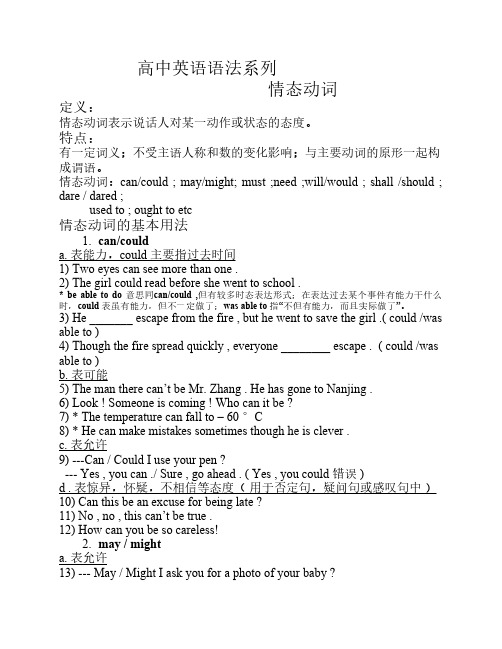
高中英语语法系列情态动词定义:情态动词表示说话人对某一动作或状态的态度。
特点:有一定词义;不受主语人称和数的变化影响;与主要动词的原形一起构成谓语。
情态动词:can/could ; may/might; must ;need ;will/would ; shall /should ; dare / dared ;used to ; ought to etc情态动词的基本用法1. can/coulda. 表能力,could 主要指过去时间1) Two eyes can see more than one .2) The girl could read before she went to school .* be able to do 意思同can/could ,但有较多时态表达形式;在表达过去某个事件有能力干什么时,could 表虽有能力,但不一定做了;was able to 指“不但有能力,而且实际做了”。
3) He _______ escape from the fire , but he went to save the girl .( could /was able to )4) Though the fire spread quickly , everyone ________ escape . ( could /was able to )b. 表可能5) The man there can’t be Mr. Zhang . He has gone to Nanjing .6) Look ! Someone is coming ! Who can it be ?7) * The temperature can fall to – 60 °C8) * He can make mistakes sometimes though he is clever .c. 表允许9) ---Can / Could I use your pen ?--- Yes , you can ./ Sure , go ahead . ( Yes , you could 错误 )d . 表惊异,怀疑,不相信等态度(用于否定句,疑问句或感叹句中)10) Can this be an excuse for being late ?11) No , no , this can’t be true .12) How can you be so careless!2. may / mighta. 表允许13) --- May / Might I ask you for a photo of your baby ?--- Yes , please . / Certainly ./ Please don’t ./ You’d better not ./ No , you mustn’t.b. 表可能,might 语气更加不肯定14) She may be at home .15) She might come to the party , but I am not sure .c .祝愿16) May you succeed !3 . musta . 表义务,意为“必须”,主观意志;而have to 为“不得不”,客观要求。
高中英语语法讲义-情态动词
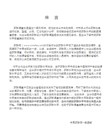
He may [might] be writing a letter. 他可能在写信。
They may [might] be going abroad next month. 他们可能在下个月出国。
③ 后接动词完成式,表示对过去可能发生的事进行推测:
另外,could还可与表示感知的动词(如see, hear, smell, taste, feel, understand等)连用表示的特定能力:
Looking down from the plane, we could see lights on the runway. 从飞机上向下看,我们可以看见机场跑道上的点点灯火。
2) 表示委婉的批评或责备:
You might have made greater progress. 你的进步本来可更大一些的。
You might at least have answered my letter. 你至少可以回我一封信嘛。
③ 表示“差点儿就要”:
I could have died laughing. 我差点儿笑死了。
二、may与might的用法
1. 表示允许
注意以下两种情况:
(1) 表示请求允许(即请求别人允许自己做某事),两者都可用,只是 might 表示的语气较委婉(但并不表示过去):
May [Might] I sit here? 我可以坐在这里吗?
1) 表示过去某事可能发生而实际上却并没发生:
A lot of men died who might have been saved.很多人本来可以获救的却死了。
It was really very dangerous. I might have killed myself. 那真的是太危险了,我差点没命了。
英语语法情态动词归纳总结
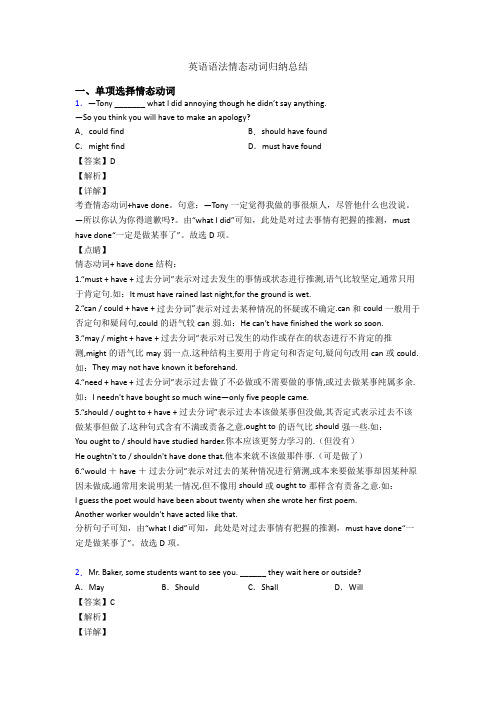
英语语法情态动词归纳总结一、单项选择情态动词1.—Tony _______ what I did annoying though he didn’t say anything.—So you think you will have to make an apology?A.could find B.should have foundC.might find D.must have found【答案】D【解析】【详解】考查情态动词+have done。
句意:—Tony一定觉得我做的事很烦人,尽管他什么也没说。
—所以你认为你得道歉吗?。
由“what I did”可知,此处是对过去事情有把握的推测,must have done“一定是做某事了”。
故选D项。
【点睛】情态动词+ have done结构:1.“must + have + 过去分词”表示对过去发生的事情或状态进行推测,语气比较坚定,通常只用于肯定句.如:It must have rained last night,for the ground is wet.2.“can / could + have + 过去分词”表示对过去某种情况的怀疑或不确定.can和could一般用于否定句和疑问句,could的语气较can弱.如:He can't have finished the work so soon.3.“may / might + have + 过去分词”表示对已发生的动作或存在的状态进行不肯定的推测,might的语气比may弱一点.这种结构主要用于肯定句和否定句,疑问句改用can或could.如:They may not have known it beforehand.4.“need + have + 过去分词”表示过去做了不必做或不需要做的事情,或过去做某事纯属多余.如:I needn't have bought so much wine—only five people came.5.“should / ought to + have + 过去分词”表示过去本该做某事但没做,其否定式表示过去不该做某事但做了,这种句式含有不满或责备之意,ought to的语气比should强一些.如:You ought to / should have studied harder.你本应该更努力学习的.(但没有)He oughtn't to / shouldn't have done that.他本来就不该做那件事.(可是做了)6.“would + have +过去分词”表示对过去的某种情况进行猜测,或本来要做某事却因某种原因未做成,通常用来说明某一情况,但不像用should或ought to那样含有责备之意.如:I guess the poet would have been about twenty when she wrote her first poem.Another worker wouldn't have acted like that.分析句子可知,由“what I did”可知,此处是对过去事情有把握的推测,must have done“一定是做某事了”。
英语语法: 情 态 动 词
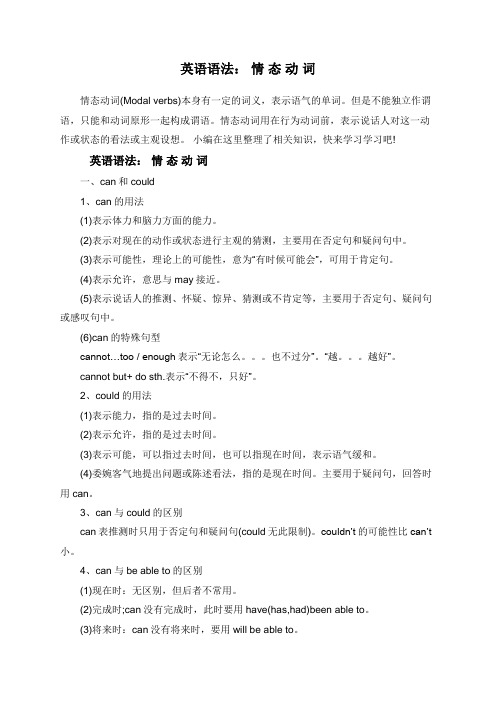
英语语法:情态动词情态动词(Modal verbs)本身有一定的词义,表示语气的单词。
但是不能独立作谓语,只能和动词原形一起构成谓语。
情态动词用在行为动词前,表示说话人对这一动作或状态的看法或主观设想。
小编在这里整理了相关知识,快来学习学习吧!英语语法:情态动词一、can和could1、can的用法(1)表示体力和脑力方面的能力。
(2)表示对现在的动作或状态进行主观的猜测,主要用在否定句和疑问句中。
(3)表示可能性,理论上的可能性,意为“有时候可能会”,可用于肯定句。
(4)表示允许,意思与may接近。
(5)表示说话人的推测、怀疑、惊异、猜测或不肯定等,主要用于否定句、疑问句或感叹句中。
(6)can的特殊句型cannot…too / enough表示“无论怎么。
也不过分”。
“越。
越好”。
cannot but+ do sth.表示“不得不,只好”。
2、could的用法(1)表示能力,指的是过去时间。
(2)表示允许,指的是过去时间。
(3)表示可能,可以指过去时间,也可以指现在时间,表示语气缓和。
(4)委婉客气地提出问题或陈述看法,指的是现在时间。
主要用于疑问句,回答时用can。
3、can与could的区别can表推测时只用于否定句和疑问句(could无此限制)。
couldn’t的可能性比can’t 小。
4、can与be able to的区别(1)现在时:无区别,但后者不常用。
(2)完成时;can没有完成时,此时要用have(has,had)been able to。
(3)将来时:can没有将来时,要用will be able to。
(4)过去时:could表示一般能力,was/were able to 表示在具体场合通过努力成功做成某事的能力。
二、may 和might1、may的用法(1)表示询问或说明一件事可不可以做。
(2)表示一件事或许会发生或某种情况可能会存在,通常用在肯定句和否定句中。
注意:表示可能性时,can’t语气强,表示“不可能”,may not语气弱,表示“可能不”。
小学英语语法情态动词

You shouldn’t be working like this.
EXERCISES
一、用适当的情态动词填空
1. You needn’t worry about me.
2. He looks so pale, he must be ill.
4)表示推测,意为“想必一定、照说应 该、估计”等。 He should be free by now.
7. ought to
1). 表示义务, 作“应当”讲, 语气比should强烈
As a student, you ought to study hard.
You oughtn’t to speak so much.
4). needn`t have done 用于否定句 表示过去“本来不需要……”
You needn’t have worried about me.
你本不必为我担心。
情态动词后面跟进行时
情态动词 + be + doing
表示“想必正在……”,“可能正在……”,“应当正在”
They may be discussing our problem. She can’t be telling the truth.
You must have gone swimming, for your hair is wet now.
2). may have done 和 might have done 也许、 或许、已经
表示对过去所发生动作的推测, 常用于肯定句 或否定句。
I’m not sure. He might have invited you.
初中英语语法专题--情态动词

初中英语语法专题情态动词一、【情态动词】又叫情态助动词。
它们具有以下特点:⑴它们必须与其他动词连用,即:情态动词+动词原形表示说话人对所述动作的看法,如需要、可能、意愿或怀疑等。
⑵绝大多数情态动词没有人称和数的变化,即第三人称单数不加-s(以be和have 开头的情态动词短语除外)。
⑶在意义上,情态动词具有“多义性"。
例:can既可表示能力,又可表示可能、允许等意义。
有can (could), may (might), must, have to, shall (should, will (would),dare (dared), need (needed), ought to等。
情态动词无人称和数的变化;不能单独使用,必须与其后的动词原形构成谓语。
^^can 表示能力,意为“能会" 表示推测, 意为“可能",常用于否定句和疑问句中表示请求,允许,意为“可以”.^^could 是can 的过去式,意为“能、会”,表示过去的能力在疑问句中表示委婉请求 . ^^may 表示请求、许可,意为“可以" 表示推测,常用于肯定句中,意为“可能、也许".^^might 是may的过去式,表推测,常用于肯定句中,意为“可能、也许” .^^must 表示主观看法,意为“必须、应该”表有把握的推测,用语肯定句 .^^need \表示需要、必须,主要用于否定句和疑问句中。
^^dare 表示敢于,主要用于否定句和疑问句中.^^should 意为“应该”,表示要求和命令表示劝告、建议.^^had better 意为“最好”,表示建议.^^used to意为“过去常常,表示过去的动作、行为.部分情态动词的基本用法:考点一情态动词知识清单1. can的基本用法:⑴表示体力或智力上的能力,即“能够,会”,可与be able to转换。
例:He can speak English. = He is able to speak English。
英语语法大攻克--情态动词

情态动词常见的情态动词有:can 能may 可以will,would (表意愿)need 需要dare 敢must 必须have to 不得不shall,should 应该(表义务)ought to 应该1.can,could 的用法1.1表能力,有“能”、“会”、“能够”的意思例如:Can you drive a car? 你会开车吗?-----Yes, I can. 我会。
-----No, I can't. 我不会。
1.2表允许,在口语中代替may,有“可以”的意思例如:Can I use your bike?我可以用你的自行车吗?1.3表示可能性,常用于否定句和疑问句例如:Can it be true?那会是真的吗?Today is Sunday. He can't be at school.今天是星期天。
他不可能在学校里。
1.4过去式could表示的语气更加委婉、客气例如:Could I come to see you tomorrow?明天我可以来见你吗?1.5 can 和be able to 的比较1) can 只有一般现在时和一般过去时两种时态(could),其他时态要用be able to的形式例如:I haven't been able to get in touch with her.我一直没能和她联系上。
2) 通常can 和be able to 可以互换例如:He will come if he can.如果可能的话,他一定会来。
2.may,might的用法2.1表示许可或征求对方的许可,有“可以”的意思。
例如:You may go now.你可以走了。
May I use your computer?我用一下你的电脑可以吗?2.2回答以may开头的疑问句有如下表达法:例如:May I smoke here? 我可以在这儿抽烟吗?-----Yes, you may.-----Yes, please.------No, you can't.------No, you mustn't.------No, you'd better not.2.3表示猜测,通常只用于陈述句例如:You may be right.你可能是对的。
英语语法之情态动词
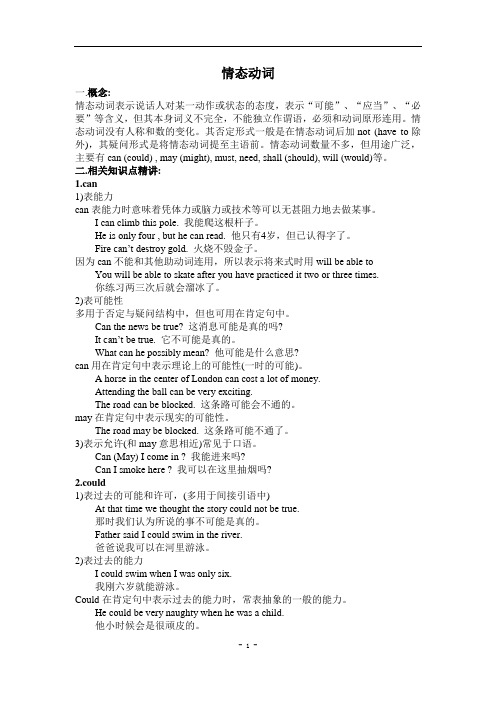
情态动词一.概念:情态动词表示说话人对某一动作或状态的态度,表示“可能”、“应当”、“必要”等含义,但其本身词义不完全,不能独立作谓语,必须和动词原形连用。
情态动词没有人称和数的变化。
其否定形式一般是在情态动词后加not (have to除外),其疑问形式是将情态动词提至主语前。
情态动词数量不多,但用途广泛,主要有can (could) , may (might), must, need, shall (should), will (would)等。
二.相关知识点精讲:1.can1)表能力can表能力时意味着凭体力或脑力或技术等可以无甚阻力地去做某事。
I can climb this pole. 我能爬这根杆子。
He is only four , but he can read. 他只有4岁,但已认得字了。
Fire can’t destroy gold. 火烧不毁金子。
因为can不能和其他助动词连用,所以表示将来式时用will be able to You will be able to skate after you have practiced it two or three times.你练习两三次后就会溜冰了。
2)表可能性多用于否定与疑问结构中,但也可用在肯定句中。
Can the news be true? 这消息可能是真的吗?It can’t be true. 它不可能是真的。
What can he possibly mean? 他可能是什么意思?can用在肯定句中表示理论上的可能性(一时的可能)。
A horse in the center of London can cost a lot of money.Attending the ball can be very exciting.The road can be blocked. 这条路可能会不通的。
may在肯定句中表示现实的可能性。
情态动词语法
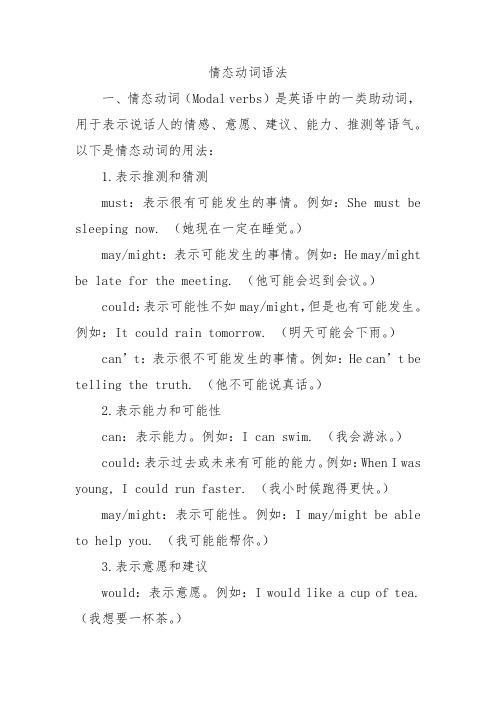
情态动词语法一、情态动词(Modal verbs)是英语中的一类助动词,用于表示说话人的情感、意愿、建议、能力、推测等语气。
以下是情态动词的用法:1.表示推测和猜测must:表示很有可能发生的事情。
例如:She must be sleeping now. (她现在一定在睡觉。
)may/might:表示可能发生的事情。
例如:He may/might be late for the meeting. (他可能会迟到会议。
)could:表示可能性不如may/might,但是也有可能发生。
例如:It could rain tomorrow. (明天可能会下雨。
)can’t:表示很不可能发生的事情。
例如:He can’t be telling the truth. (他不可能说真话。
)2.表示能力和可能性can:表示能力。
例如:I can swim. (我会游泳。
)could:表示过去或未来有可能的能力。
例如:When I was young, I could run faster. (我小时候跑得更快。
)may/might:表示可能性。
例如:I may/might be able to help you. (我可能能帮你。
)3.表示意愿和建议would:表示意愿。
例如:I would like a cup of tea. (我想要一杯茶。
)should:表示应该做的事情。
例如:You should go to see a doctor if you feel sick. (如果你感到不舒服,你应该去看医生。
)4.表示命令和建议must:表示强制性的命令或规定。
例如:You must wear a helmet when riding a bike. (骑自行车时必须戴头盔。
)should:表示建议或推荐。
例如:You should study hard for the exam. (你应该努力学习考试。
情态动词英语语法知识精讲
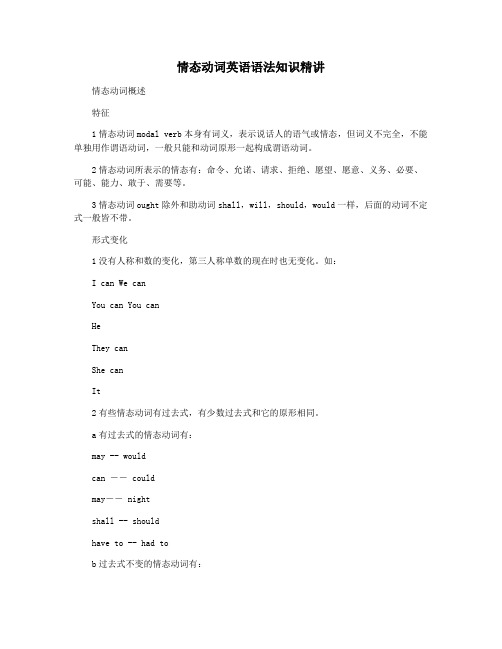
情态动词英语语法知识精讲情态动词概述特征1情态动词modal verb本身有词义,表示说话人的语气或情态,但词义不完全,不能单独用作谓语动词,一般只能和动词原形一起构成谓语动词。
2情态动词所表示的情态有:命令、允诺、请求、拒绝、愿望、愿意、义务、必要、可能、能力、敢于、需要等。
3情态动词ought除外和助动词shall,will,should,would一样,后面的动词不定式一般皆不带。
形式变化1没有人称和数的变化,第三人称单数的现在时也无变化。
如:I can We canYou can You canHeThey canShe canIt2有些情态动词有过去式,有少数过去式和它的原形相同。
a有过去式的情态动词有:may -- wouldcan ―― couldmay―― nightshall -- shouldhave to -- had tob过去式不变的情态动词有:must - must 或had toought to - ought toneed---needdare - dare亦可用dared3大多数情态动词后面可用动词的进行式、完成式和被动形式,如:canmay,mustbe doing,canmay,must have done,canmay,mustbe done等。
否定式情态动词和助动词一样,后面可直接跟否定词not。
现将情态动词的否定式及其否定式的简略式简略式用于口语中列举如下:shall not--shan't [FB:nt]will not---won't [wEunt]can not-can't [kB:nt]must not-mustn't [5mQsnt]should not-- shouldn'twould not-- wouldn'tcould not-- couldn'tdare not- daren't [dZEnt]need not-- needn't在疑问句中的用法情态动词在疑问句中的用法和助动词相同。
情态动词分类及用法简介

情态动词分类及用法简介
情态动词在英语语法中的分类主要包括以下几种:
1.推测情态:表示对未来或未知情况的推测,常用的情态动词有may,
might,could,shall等。
例如,“She may be late”,“It might rain tomorrow”。
2.义务情态:表示必须或应该做某事,常用的情态动词有must,should,
ought to等。
例如,“You must be careful”,“You should eat more vegetables”。
3.能力情态:表示具备做某事的能力或可能性,常用的情态动词有can,
could,be able to等。
例如,“I can swim”,“He will be able to walk soon”。
4.允许情态:表示允许或不被禁止做某事,常用的情态动词有may,can等。
例如,“You may leave now”,“Can I use your phone?”。
5.虚拟情态:表示与实际情况相反的情况或假设的情况,常用的情态动词有
should,would,might,could等。
例如,“If I should win the lottery,
I would buy a new car”。
6.必须情态:表示必须或应当做某事,常用的情态动词有must等。
例如,
“You must complete your homework”。
这些分类概括了情态动词在英语语法中的主要用法。
通过了解和掌握这些分类,可以帮助我们更好地理解和使用情态动词,从而提高我们的英语表达能力。
英语语法情态动词详解
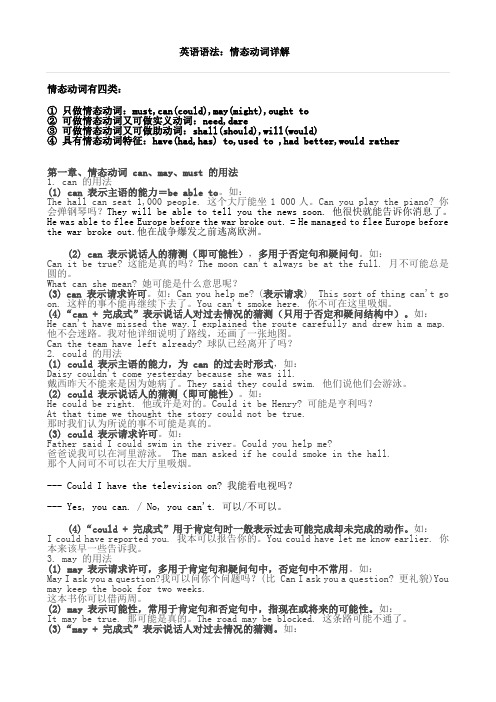
英语语法:情态动词详解情态动词有四类:①只做情态动词:must,can(could),may(might),ought to②可做情态动词又可做实义动词:need,dare③可做情态动词又可做助动词:shall(should),will(would)④具有情态动词特征:have(had,has) to,used to ,had better,would rather第一章、情态动词 can、may、must 的用法1. can 的用法(1) can 表示主语的能力=be able to。
如:The hall can seat 1,000 people. 这个大厅能坐1 000人。
Can you play the piano? 你会弹钢琴吗?They will be able to tell you the news soon. 他很快就能告诉你消息了。
He was able to flee Europe before the war broke out. = He managed to flee Europe before the war broke out.他在战争爆发之前逃离欧洲。
(2) can 表示说话人的猜测(即可能性),多用于否定句和疑问句。
如:Can it be true? 这能是真的吗?The moon can't always be at the full. 月不可能总是圆的。
What can she mean? 她可能是什么意思呢?(3) can 表示请求许可。
如:Can you help me? (表示请求) This sort of thing can't go on. 这样的事不能再继续下去了。
You can't smoke here. 你不可在这里吸烟。
(4)“can + 完成式”表示说话人对过去情况的猜测(只用于否定和疑问结构中)。
如:He can't have missed the way.I explained the route carefully and drew him a map. 他不会迷路。
英语语法: 情 态 动 词
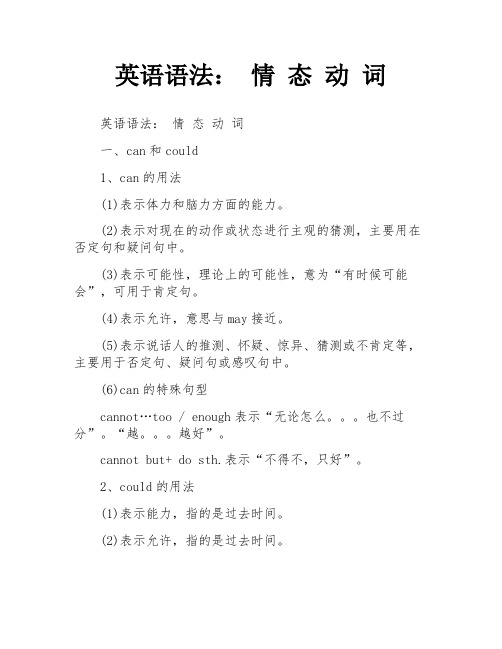
英语语法:情态动词英语语法:情态动词一、can和could1、can的用法(1)表示体力和脑力方面的能力。
(2)表示对现在的动作或状态进行主观的猜测,主要用在否定句和疑问句中。
(3)表示可能性,理论上的可能性,意为“有时候可能会”,可用于肯定句。
(4)表示允许,意思与may接近。
(5)表示说话人的推测、怀疑、惊异、猜测或不肯定等,主要用于否定句、疑问句或感叹句中。
(6)can的特殊句型cannot…too / enough表示“无论怎么。
也不过分”。
“越。
越好”。
cannot but+ do sth.表示“不得不,只好”。
2、could的用法(1)表示能力,指的是过去时间。
(2)表示允许,指的是过去时间。
(3)表示可能,可以指过去时间,也可以指现在时间,表示语气缓和。
(4)委婉客气地提出问题或陈述看法,指的是现在时间。
主要用于疑问句,回答时用can。
3、can与could的区别can表推测时只用于否定句和疑问句(could无此限制)。
couldn’t的可能性比can’t小。
4、can与be able to的区别(1)现在时:无区别,但后者不常用。
(2)完成时;can没有完成时,此时要用have(has,had)been able to。
(3)将来时:can没有将来时,要用will be able to。
(4)过去时:could表示一般能力,was/were able to 表示在具体场合通过努力成功做成某事的能力。
二、may 和might1、may的用法(1)表示询问或说明一件事可不可以做。
(2)表示一件事或许会发生或某种情况可能会存在,通常用在肯定句和否定句中。
注意:表示可能性时,can’t语气强,表示“不可能”,may not语气弱,表示“可能不”。
2、might的用法(1)表示询问或允许,指的是过去时间。
(2)表示可能发生的事,可以指过去时间,也可以指现在时间,语气更加不肯定,可能性比may小一些。
第十二讲 情态动词(英语语法系统全面讲解)
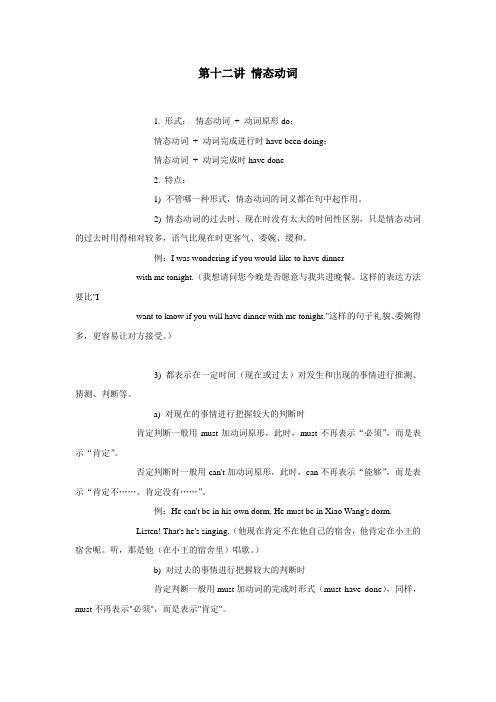
第十二讲情态动词1. 形式:情态动词+ 动词原形do;情态动词+ 动词完成进行时have been doing;情态动词+ 动词完成时have done2. 特点:1) 不管哪一种形式,情态动词的词义都在句中起作用。
2) 情态动词的过去时、现在时没有太大的时间性区别,只是情态动词的过去时用得相对较多,语气比现在时更客气、委婉、缓和。
例:I was wondering if you would like to have dinnerwith me tonight.(我想请问您今晚是否愿意与我共进晚餐。
这样的表达方法要比"Iwant to know if you will have dinner with me tonight."这样的句子礼貌、委婉得多,更容易让对方接受。
)3) 都表示在一定时间(现在或过去)对发生和出现的事情进行推测、猜测、判断等。
a) 对现在的事情进行把握较大的判断时肯定判断一般用must加动词原形,此时,must不再表示“必须”,而是表示“肯定”。
否定判断时一般用can't加动词原形,此时,can不再表示“能够”,而是表示“肯定不……、肯定没有……”。
例:He can't be in his own dorm. He must be in Xiao Wang's dorm.Listen! That's he's singing.(他现在肯定不在他自己的宿舍,他肯定在小王的宿舍呢。
听,那是他(在小王的宿舍里)唱歌。
)b) 对过去的事情进行把握较大的判断时肯定判断一般用must加动词的完成时形式(must have done),同样,must不再表示"必须",而是表示"肯定"。
例:1989年1月四级第41题Mary's score on the test is the highest in her class; she ____have studied very hard.A) may B) should C) must D) ought to全句的意思是“玛丽考试成绩全班第一,她学习很刻苦”。
语法中的情态动词的用法和意义
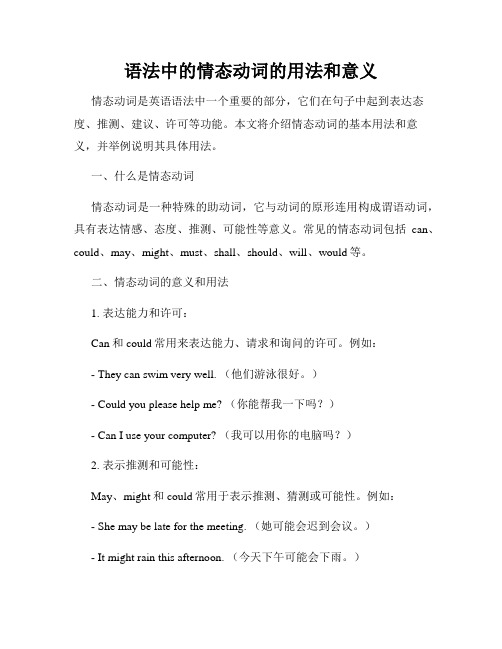
语法中的情态动词的用法和意义情态动词是英语语法中一个重要的部分,它们在句子中起到表达态度、推测、建议、许可等功能。
本文将介绍情态动词的基本用法和意义,并举例说明其具体用法。
一、什么是情态动词情态动词是一种特殊的助动词,它与动词的原形连用构成谓语动词,具有表达情感、态度、推测、可能性等意义。
常见的情态动词包括can、could、may、might、must、shall、should、will、would等。
二、情态动词的意义和用法1. 表达能力和许可:Can和could常用来表达能力、请求和询问的许可。
例如:- They can swim very well. (他们游泳很好。
)- Could you please help me? (你能帮我一下吗?)- Can I use your computer? (我可以用你的电脑吗?)2. 表示推测和可能性:May、might和could常用于表示推测、猜测或可能性。
例如:- She may be late for the meeting. (她可能会迟到会议。
)- It might rain this afternoon. (今天下午可能会下雨。
)- He could be at home. (他有可能在家。
)3. 表示义务和必须:Must和have to常用来表示义务、必须和建议。
例如:- You must finish your homework before watching TV. (你必须先完成作业再看电视。
)- We have to follow the rules. (我们必须遵守规章。
)4. 表达意愿和请求:Shall和will用于表示意愿、请求和答应。
例如:- Shall we go to the park tomorrow? (我们明天去公园好吗?)- I will help you with your project. (我会帮助你完成项目。
英语语法-情态动词

A. Yes, I won’t
B. No, I won’t
C. No, I will
D. Yes, I will
6. We __C__ last night, but we went to the concert instead.
A.must have studied B. might study
C. should have studied D. would study
(3)would可表示过去反复发生的动作或某种倾向。 Would表过去习惯时比used to 正式,且没有“现已 无此习惯”的含义。
During the vacation he would visit me every week. (4) 表示估计或猜想。
I thought he would have told you all about it.
5.The street are all dry. It couldn’t have rained during the night.
3. 表责备时:
may/might have +ed(语气委婉)过去本 可能…
can/could have +ed (语气委婉) 过去本 能……
should have +ed (语气强烈) 过去本应 该……,而未……
3. The report is written after careful investigation, so it
should be reliable.
4.---I didn’t see Mary at the meeting yesterday.
---She might have been ill, I guess.
专升本英语语法情态动词
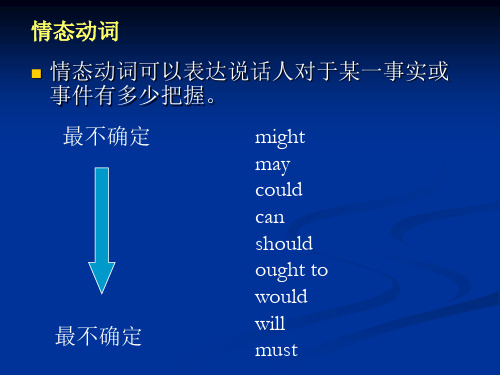
She could have told me the news but she refused to. 她本可以告诉我这个消息,但是她没有。
must+have+done 表示对过去行为的肯定推 测,意为 “一定,想必”
情态动词
情态动词可以表达说话人对于某一事实或 事件有多少把握。
最不确定 最不确定
might may could can should ought to would will must
情态动词+have+done
may/might +have+done 表示对过去行为的推 测
He may/might have missed the train. 他可能误了火车。
should/ought to+have+done 表示过去应该做 ave asked me if I wanted a trackjacket. 你本来应该先问清楚我是否需要一件运动衫。
shouldn’t+have+done 表示某种行为不该发生 但却发生了
She shouldn’t have left him. 她不应该离开他。
I knew the screams must have come from Mr. Areden’s house. 我知道尖叫声一定是从阿登先生的房子里传 出来的。
needn’t +have+done 表示做了没有必要做的 事
You needn’t have watered the flowers, for it is going to rain. 你本来没有必要浇花,因为马上要下雨了。
情态动词-英语语法

C. must be dropping
D. must have been dropped
三、情态动词的虚拟功能用法
• Should/ought to/need/+have done也可用来表示 虚拟,意为本..做某事,而事实上并没有做; 否 定句表示“本不做某事而做事实上了.
• You should have been more careful in this experiment.
• 5. will • will表示意愿,决心(常用于第一人称);
用于第二人称疑问句表示征求请求或提出 建意. • I’ll never do that again. • Will you (please) do sth.? • Will you please go with me? Would表示请求,建议,比will委婉; ---Would you like a cup of tea --- Yes, I’d like to.----No, thanks.
4. need
1.) 实义动词: need+ n. / to do sth. 2) 情态动词: need+动词原形;否定形式为need not do sth.
e.g. ----Need you have a rest? ---- Yes, I must. / No, I needn't.
We needn’t have a rest now. Do you need to have a rest? Yes, I do. / No, I don’t.
一、情态动词的实意功能用法
1.can , could can (could) 表示现在和过去能力、 He could speak English a little a year ago, and
英语语法之情态动词
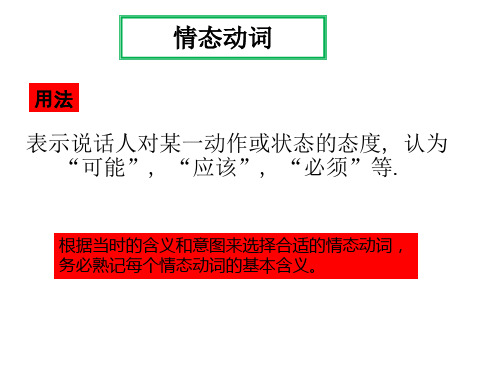
禁止,不允许
Everyone mustn’t go out.
肯定回答must,否定回 答needn’t/don’t have to
一定是,准是
Must he go to school? Yes, he must. No, he needn’t/don’t have to.
He must be mad.
√
√3may
4might
4√第一人称
will/would
2√第二人称 意愿
shall
3√一三人称
should
应该
must
1√
必须
含义
英文
表能力 can
could
表许可 can (可以) may
表请求\ can 征求意见 Could (可以吗)
Will/would
根据实际 意义回答
shall May might
You could be right.
It may rain tomorrrow. He might be sick. Can it be true? It can’t be true.
must表必须Fra bibliotek用法 肯定句 否定句 疑问句
表推测 肯定句
Need(需 疑问句 要)
否定句
dare
意义 必须
例句 I must go now.
肯定回答must,否定回 答needn’t
没必要,不必
Need I stay here? Yes, you must. No, you needn’t.
He needn’t listen to her.
敢
I dare have a bet with you.
- 1、下载文档前请自行甄别文档内容的完整性,平台不提供额外的编辑、内容补充、找答案等附加服务。
- 2、"仅部分预览"的文档,不可在线预览部分如存在完整性等问题,可反馈申请退款(可完整预览的文档不适用该条件!)。
- 3、如文档侵犯您的权益,请联系客服反馈,我们会尽快为您处理(人工客服工作时间:9:00-18:30)。
b. 用“主语+must be doing” 表示对现在正在进行或将来正在进行的事情的推测,可翻译为 “想必正在…” “一定正在…”
They must be playing football now.
(No , you needn’t / don’t have to.)
* mustn’t是表示“禁止”。
You mustn’t talk loudly here.
You mustn’t spit here.
2) must 表猜测,只用于肯定句,可译成:准是,肯定是。(其否定、疑问句用can.)
1) must 表示“必须,必要”
a. 在肯定陈述句中。
You must rely on yourself.
You must pay the money.
b. must 意为“必须,必要”,其否定式为needn’t 或don’t have to 不必
e.g. You need not be back by 10 o’clock.
Key: A
[真题再现3]
—When can I come for the photos? I need them tomorrow afternoon.
—They _____ be ready by 12:00. (NMET’98)
A. can B. should C. might D. need
--- What a question! It’s surprising ___, the first spaceman in China.
A. you didn’t know our national hero
B. to you not to know him
C. you should know nothing about
5) can可表示“允许,请求”
You can get the reply next day.
You can reach an agreement tomorrow.
*--- Could (I use your bike)? 委婉语气
--- Yes, you can. / Yes, please. / Yes, go ahead. / Do, please.
b. have to可用于较多的时态,而must一般用于现在时,其过去时常用have to的过去时had to来替换。
c. must 可作“偏偏”“硬要”解,指令人不快的事情。
Why must it rain on Sunday?
怎么偏偏星期天下雨?
The car must break down when we were about to start off.
I don’t like to stay here any longer. I must leave now.
Since it is snowing, we have to stay here.
My brother is ill. I have to look after him in the hospital.
我们就要出发时偏偏车坏了
d. must 还可表示必然的结果。
All men must die. 人固有一死。
If you don’t hurry, you must miss the train.
3. should与ought to(一般不用于疑问句)
1)表示劝告或建议、命令,翻译为“应当,应该”
I should have helped him but I was too busy.
本结构的否定形式:should not have done 表示做了不该做的事。
You shouldn’t have lent him money before.
b. 用于表示建议、命令的动词suggest, advise, order, demand, require, request, desire, ask, insist 等词的宾语从句中,谓语应由 “should+动词原形”构成。 Should可以省略。
I should advise you to say less and do more.
5) 用于虚拟语气
a. “should have done = ought to have done”表示本来该做的事却事实上没做。有责怪,内疚之意。
You should have told me the news yesterday. (in fact, you didn’t tell me)
→They must have left, haven’t they?
Look at his new car. He must have earned a lot of money.( He has earned a lot of money.)
She must have come back late last night.( She came back late last night.)
[点拨]选B。因顾客明天下午要用照片,所以商家理应在12点以前将照片洗出。should在此处表示“按理应当;估计”。
[真题再现4] You can’t imagine that a well-behaved gentleman _____ be so rude to a lady. (上海2001)
You don’t have to be back by 10 o’clock.
You mustn’t be back by 10 o’clock.( wrong)
c. 在疑问句中。
---Must I be back here before supper?
---Yes, you must.
A. must B. need C. should D. can
Key: C
You should arrive at the airport two hours before he goes.
3)表惊奇、怀疑、不满等情绪。 意为“竟会,竟然”。如:
eg. Why should you be so late today?
你今天怎么来得这么晚?
eg. How should I know? 我怎么会知道?
Why should I invite him?
为什么我要邀请他?
[真题再现1]
--- Yang Liwei has won great honor for our country.
--- Who is Yang Liwei?
She should stay in bed for two days.
You ought to try your best to do it.
2) 表示推理、推论,可译作 “按理应当;估计”“理应;该”
e.g. It’s nearly seven o’clock. Jack ___ be here at any moment.
e.g. He suggested that I (should) accept the job.
The doctor advised that we should do more exercises.
4. can 与could
1) 指能力
He is able to\can solve this problem.
They are going to make a film next month here. They must be looking for actors.
c. 用“主语+must have done”表示对过去发生的事情进行推测,可翻译为 “想必已经…”
eg. They must have left.
D. you knew nothing about him
Key: C
[真题再现2] I often see lights in that empty house. Do you think I ______ report it to the police? (2004全国卷III)
A. should B. may C. will D. can
→They must be playing football now, aren’t they?
It must be raining outside.
→It must be raining outside, isn’t it?
According to the weather forecast, it must be snowing tomorrow.
(表示根据逻辑推理必然要发生某事.)
a. 用“主语+must + 动词原形”表示对现在发生的事情的推测,常翻译为 “准是…”
eg. The teacher must be in the office, for the light is on.
That fat man coming this way must be Mr White.
情态动词
1. 常用的情态动词有
can could
may might
must have to
shall
should ought to
will would
need dare
情态动词无人称变化,后面接不带to的动词不定式,即跟动词原形。
2. must 的用法如下:
No, you can’t.
